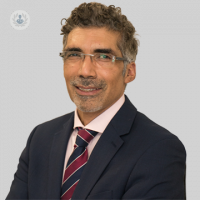The hidden influences on osteoporosis and personalised care
Written by:While aging and genetic predisposition undoubtedly play pivotal roles in the development of osteoporosis, it is essential to recognise that there are numerous secondary factors contributing to this condition. In his latest online article, Dr Taher Mahmud explains that these secondary factors, while often overshadowed, play a vital role in shaping the course of osteoporosis treatment.

Upon receiving a diagnosis of osteoporosis, it is customary for your healthcare provider to conduct comprehensive assessments aimed at identifying these secondary causes. At the London Osteoporosis Clinic, our specialists adopt this approach because understanding the underlying cause of your osteoporosis is fundamental to tailoring an effective treatment plan that caters to your specific needs.
Secondary causes of osteoporosis encompass a wide range of factors, including certain medical conditions such as rheumatoid arthritis, hyperthyroidism, or hormonal imbalances. Lifestyle choices can also significantly contribute, with smoking, heavy alcohol consumption, and prolonged use of specific medications, like corticosteroids, being potential culprits. It is essential to acknowledge that this list is not exhaustive, and while anyone can develop osteoporosis, these factors can heighten the risk.
The process of identifying and managing these secondary factors is an integral component of an effective osteoporosis treatment plan. For instance, if your osteoporosis is linked to a specific medication, your physician may adjust your dosage or recommend an alternative treatment. In cases where lifestyle factors are implicated, you might receive guidance to reduce alcohol consumption, quit smoking, or modify your dietary choices.
With the appropriate treatment and management strategies in place, the outlook for individuals with osteoporosis can be remarkably improved. We have witnessed gratifying results, including enhanced bone density. The overarching objective in managing osteoporosis is to combat bone weakness effectively and mitigate the risk of future fractures.
In light of this, your aspiration as a patient dealing with osteoporosis should revolve around building stronger, healthier bones and safeguarding against potential fractures. This transformative journey often commences with a comprehensive understanding of the root cause of your osteoporosis, which subsequently informs a personalised treatment approach designed to meet your unique needs. By addressing both the primary and secondary factors contributing to your condition, you can take significant strides toward improving your bone health and overall quality of life.
Dr Taher Mahmud is an esteemed rheumatologist with over 30 years of experience. You can schedule an appointment with Dr Mahmud on his Top Doctors profile.


